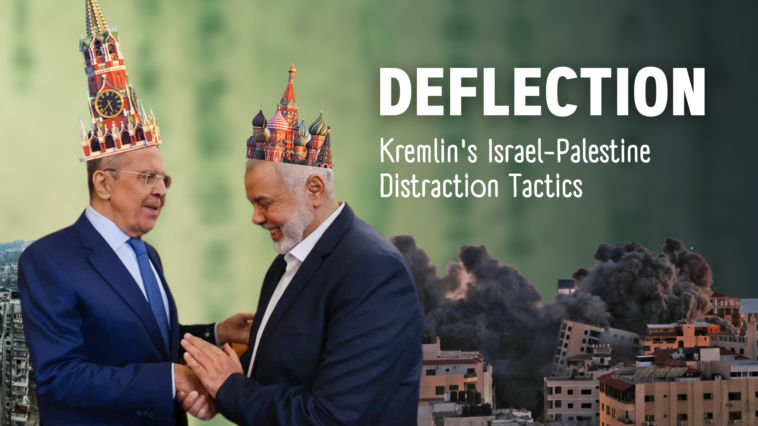Contributing author Zarina Zabrisky, US journalist
In the context of the Kremlin’s hybrid war, conventional “hot” warfare is just one element of a multifaceted strategy, “multi-domain” war, according to The US Lt. Gen. Ben Hodges, former commander of NATO troops in Europe, describes it.
While the war in Ukraine—and now in Israel—may be more visible, it’s essential to recognize that the Kremlin’s tactics extend well beyond the battlefield. The narratives it constructs, often riddled with misinformation and propaganda, are a significant part of its arsenal. By analyzing and debunking these narratives, we gain a deeper understanding of the Kremlin’s strategic goals and how it seeks to influence global opinion. These narratives serve as a crucial dimension of its hybrid warfare, shaping perceptions, sowing confusion, and attempting to deflect attention from its actions in Ukraine.
Continuing exposing the Kremlin’s narratives is critical for a comprehensive picture of its war strategies and tactics. This article is a look at the Kremlin’s weaponization of the Israeli-Hamas conflict and an attempt to hide its war crimes in Ukraine.
Israel’s approach to the Russian invasion in Ukraine stemmed from Israel’s considerations of Russia’s influence in the Middle East. Still, even though Israel has refrained from imposing international sanctions on Russia for its war of aggression in Ukraine and limited its support for Ukraine primarily to humanitarian aid, the Kremlin failed to send official condolences on the massacre of Israeli citizens by Hamas on October 7 2023. So far, the Russian government only expressed deep concern about the situation and called on the parties to stop violence and even blocked a UN Security Council resolution condemning the Palestinian attack on Israel. Hamas has shown gratitude to Moscow for what they perceive as a “worthy stance” taken by Russia.
This gratitude is well-earned. Unlike many Western countries, Russia does not classify Hamas as a terrorist organization. The Kremlin-funded media has been supportive of Hamas. It employs favorable terms, referring to Palestinian militants as “fighters” rather than “terrorists.”
Russian propaganda highlights an alliance between Iran, a key supporter of Hamas, and Russia. Iran and the broader Muslim world are presented as allies of Russia, while Israel is portrayed as an ally of the United States. Furthermore, the Kremlin’s blame game never fails to hold the United States and the European Union responsible for all wars, from the Russian invasion in Ukraine to the Israeli-Hamas conflict.
In addition, the Kremlin media doubts there was a tragedy in kibbutz the Kfar Aza, just as they were denying Russian atrocities in Bucha, Ukraine. The Kremlin propagandists claim that the Russian military only strike military objects and use “humane” ways of fighting. An old lady from Kherson addressed these claims while climbing the ladder to pull the film on the windows smashed by a Russian missile. “We lived last winter without water and power, carrying water in buckets in freezing temperatures, under Russian shelling. What humanity are they talking about?” she said in an impromptu interview. “The Russians are terrorists, just as Hamas.”
Kremlin propagandists also insinuate that Israel’s military actions may lead Western nations to reduce military assistance to Ukraine to demoralize Ukrainians.
But most and foremost, the Kremlin employs a deflection tactic here, by strategically diverting international attention from its own war crimes in Ukraine by using the Israel-Palestinian conflict to shift the focus away from its actions in Ukraine. The Kremlin presents the Israel-Hamas confrontation as the most pressing issue, while simultaneously downplaying or deflecting from its culpability in the war in Ukraine. With the Israel-Palestinian conflict dominating the world stage, the Kremlin aims to gain an advantage in several ways:
Shifting blame. The Kremlin uses this deflection tactic to portray itself as a neutral or humanitarian actor in the Israel-Palestinian crisis and gladly frames Israeli-Hamas current war as another failure of the Western-dominated world order.
Creating confusion. By highlighting the complexities of the Israel-Palestinian situation, the Kremlin adds to the global narrative’s intricacy, making it harder for the international community to focus on Russia’s actions in Ukraine.
Manipulating public opinion: The Kremlin employs this strategy to influence public opinion, particularly in countries that may not be fully informed about the situation in Ukraine. By highlighting atrocities in Sector Gaza, it aims to shift the global community perception of its “special military operation” in Ukraine.
Creating division and discord in Western democratic countries: The Kremlin is exploiting the Jewish question to “divide and conquer” to weaken the unity of Western nations, and making it challenging for them to take a cohesive stance, in particular against the Kremlin’s actions in Ukraine. The Israeli-Palestinian conflict’s emotional nature and its ability to polarize the global community have provided the Kremlin with a powerful tool to further its own interests and foster schisms within Western societies.
In essence, this age-old strategy is a means for the Kremlin to deflect attention from its war crimes in Ukraine by exacerbating divisions in the West. The Kremlin’s deflection tactic relies on exploiting the Israel-Palestinian conflict’s global attention to obscure its actions in Ukraine, shape the narrative in its favor and divert scrutiny from its war crimes.
Whether the Kremlin is directly involved and responsible for the Hamas attack remains to be proved by evidence and the investigations are ongoing. At this point, we can confidently say that the Israeli-Palestinian conflict is weaponized by the Kremlin and is beneficial for its policy. The hybrid war continues.

